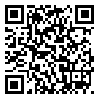Volume 25, Issue 3 (2018)
EIJH 2018, 25(3): 19-32 |
Back to browse issues page
Download citation:
BibTeX | RIS | EndNote | Medlars | ProCite | Reference Manager | RefWorks
Send citation to:



BibTeX | RIS | EndNote | Medlars | ProCite | Reference Manager | RefWorks
Send citation to:
Sardabi N, Biria R, Ameri Golestan A. Becoming an EFL Teacher: Prospective Teachers’ Professional Identity in a Critical Teacher Education Program. EIJH 2018; 25 (3) :19-32
URL: http://eijh.modares.ac.ir/article-27-44332-en.html
URL: http://eijh.modares.ac.ir/article-27-44332-en.html
1- PhD student, Department of English, Isfahan Branch (Khorasgan), Islamic Azad University, Isfahan, Iran
2- Associate Professor, Department of English, Isfahan Branch (Khorasgan), Islamic Azad University, Isfahan, Iran , r_biria@yahoo.com
3- Assistant professor, Department of English, Majlesi Branch, Islamic Azad University, Isfahan, Iran
2- Associate Professor, Department of English, Isfahan Branch (Khorasgan), Islamic Azad University, Isfahan, Iran , r_biria@yahoo.com
3- Assistant professor, Department of English, Majlesi Branch, Islamic Azad University, Isfahan, Iran
Abstract: (761 Views)
Transmission-based teacher education programs have mostly dominated the field of teaching English as a foreign language. Considering the prominent position of critical pedagogical principles in prospective teachers’ perceptions of their professional roles and responsibilities, there is a need for detailed investigations of teacher education programs informed by the tenets of critical pedagogy in prospective teachers’ professional identity. There has been a paucity of research that addresses the impact of such programs on prospective teachers’ professional identity in an EFL context; therefore, this study intends to address the gap. This qualitative study was conducted to examine the role of a critical-informed teacher education program in influencing prospective EFL teachers’ professional identity construction. Participants were 19 prospective teachers whose process of professional identity construction were analysed through reflective journals, class discussions, and semi-structured interviews before and after the program. Results of the study revealed three major shifts in prospective teachers’ professional identity: “from a student’s voice to a teacher’s voice”, “from an uncritical attitude to developing agency”, “from a narrow view of ELT to a broad view”. To foster critical ideas in EFL prospective teachers, the study recommends the use of dialogic discussions and written reflective tasks in teacher education programs.
Keywords: Critical pedagogy, Critical pedagogy-informed (CP-informed) teacher education, Professional identity, Prospective teachers
Article Type: Original Research |
Subject:
Arts and Humanities (General)
Received: 2020/07/10 | Accepted: 2018/06/15 | Published: 2018/06/15
Received: 2020/07/10 | Accepted: 2018/06/15 | Published: 2018/06/15
Send email to the article author
| Rights and permissions | |
 |
This work is licensed under a Creative Commons Attribution-NonCommercial 4.0 International License. |







